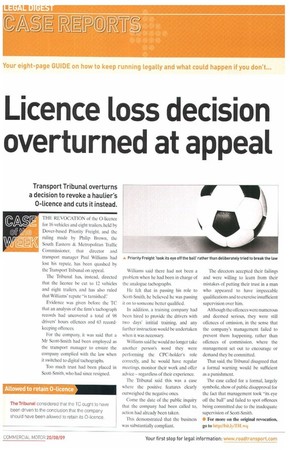Licence loss decision overturned at appeal
Page 22

If you've noticed an error in this article please click here to report it so we can fix it.
Transport Tribunal overturns a decision to revoke a haulier's 0-licence and cuts it instead.
THE REVOCATION of the 0-licence for 16 vehicles and eight trailers, held by Dover-based Priority Freight, and the ruling made by Philip Brown, the South Eastern & Metropolitan Traffic Commissioner, that director and transport manager Paul Williams had lost his repute, has been quashed by the Transport Tribunal on appeal.
The Tribunal has, instead, directed that the licence be cut to 12 vehicles and eight trailers, and has also ruled that Williams' repute "is tarnished': Evidence was given before the TC that an analysis of the firm's tachograph records had uncovered a total of 98 drivers' hours offences and 63 recordkeeping offences.
For the company. it was said that a Mr Scott-Smith had been employed as the transport manager to ensure the company complied with the law when it switched to digital tachographs.
Too much trust had been placed in Scott-Smith, who had since resigned. Williams said there had not been a problem when he had been in charge of the analogue tachographs
He felt that in passing his role to Scott-Smith, he believed he was passing it on to someone better qualified.
In addition, a training company had been hired to provide the drivers with two days' intitial training, and any further instruction would be undertaken when it was necessary Williams said he would no longer take another person's word they were performing the CPC-holder's role correctly, and he would have regular meetings, monitor their work and offer advice — regardless of their experience.
The Tribunal said this was a case where the positive features clearly outweighed the negative ones.
Come the date of the public inquiry that the company had been called to, action had already been taken.
This demonstrated that the business was substantially compliant. directors accepted their failings and were willing to learn from their mistakes of putting their trust in a man who appeared to have impeccable qualifications and to exercise insufficient supervision over him.
Although the offences were numerous and deemed serious, they were still offences of omission, in the sense that the company's management failed to prevent them happening, rather than offences of commission, where the management set out to encourage or demand they be committed.
That said, the Tribunal disagreed that a formal warning would be sufficient as a punishment.
The case called for a formal, largely symbolic, show of public disapproval for the fact that management took -its eye off the ball" and failed to spot offences being committed due to the inadequate supervision of Scott-Smith.
• For more on the original revocation, go to hti 0/bitty/TSB% q




































































































































